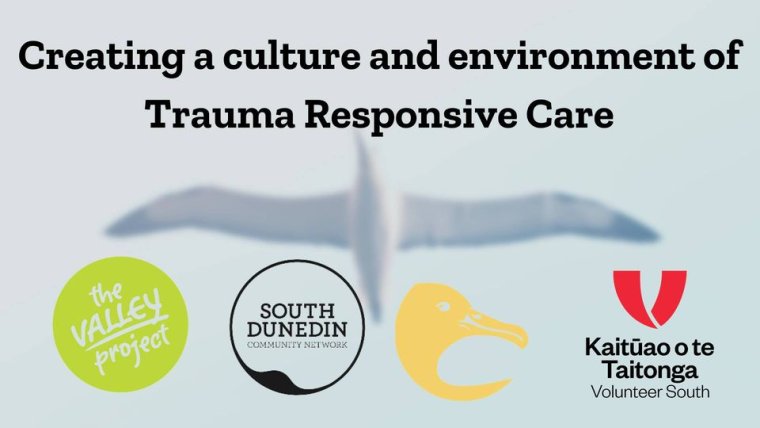Free Workshop - Creating a culture and environment of Trauma Responsive Care

Our team in Ōtepoti is very proud to be part of the organisations supporting this initiative. This invite has limited spaces so be sure to get in quick!
Creating a culture and enviornment of Trauma Responsive Care
The workshops follow the structure of the ‘6R’s’ in the Trauma Responsive Care Model developed by Andrea Greer in her Master’s thesis, Relationships Matter? (Greer, 2015).
The ‘6R’s provide a framework for participants to follow the delivery of the content and also provides an easy way to re-call the knowledge and information delivered.
The 6R’s are Recognising Trauma, Being Responsive, Regulate, Relate, Reason and Restoration. Using the 6R’s of the model, we will delve into how to create a climate and culture of Trauma Responsive Care within your organisation.
You attend two mornings or two afternoons.
To register, click here.
Workshop 1
Overview of research
• Recognising Trauma- What causes trauma, effects of trauma on the brain, body and nervous system.
• Quick overview of attachment theory and the developing brain
• The different attachment styles and reflecting on what attachment style your workplace or organisation might be.
• Being Responsive Strategy #1: The importance of staged transitions, managing change, welcoming and exiting clients. Discussing how everyone plays a part in creating a trauma responsive culture including receptionist, admin staff, frontline staff, management etc.
• Being Responsive Strategy #2: Being the secure base. How we can be that for our colleagues and for clients we interact with. Brainstorming what a ‘secure base’ organisation and workplace
environment would look like. Learning about how every interaction is an intervention.
• Regulate Strategy #1: The brainstem and neuroception of safety. Why an environment of safety
is so important and how to create an environment of safety.
Workshop 2
Reflecting on learnings from previous workshop and delving more into creating an environment of safety and connection.
• Regulate Strategy #2: The midbrain, the importance of rhythmic, repetitive and sensory activities and creating sensory spaces that could help regulate clients and staff.
• Relate: The limbic system, understanding coregulation and how to bring healing through connection.
• Relate: Understanding the impact of toxic shame and how to break the shame cycle through the use of empathy and validation.
• Relate: The importance of self-care.
• Reason: The Cortex, developing the skills for self regulation. Understanding the function of the cortex and strategies to help integrate the cortex and the lower parts of the brain. Developing a language for Trauma Responsive culture and change.
• Restoration: How we can apply this model with our tamariki, whanau and communities to bring about restoration. Breaking down what this would like in practice.
The trainer
Andrea Greer
Andrea has a Master’s of Social Welfare distinction, endorsed in Mental Health Practice, University of Otago with 14 years practice based experience with tamariki & youth within Aotearoa New Zealand.
At a national level, Andrea’s ‘Therapeutic Model Of Care” now renamed as “Trauma Responsive Care Model” was implemented by Oranga Tamariki in their group homes.
Andrea is passionate about bringing healing and restoration to tamariki who have experienced trauma.
To register, click here.

 Dunedin
Dunedin